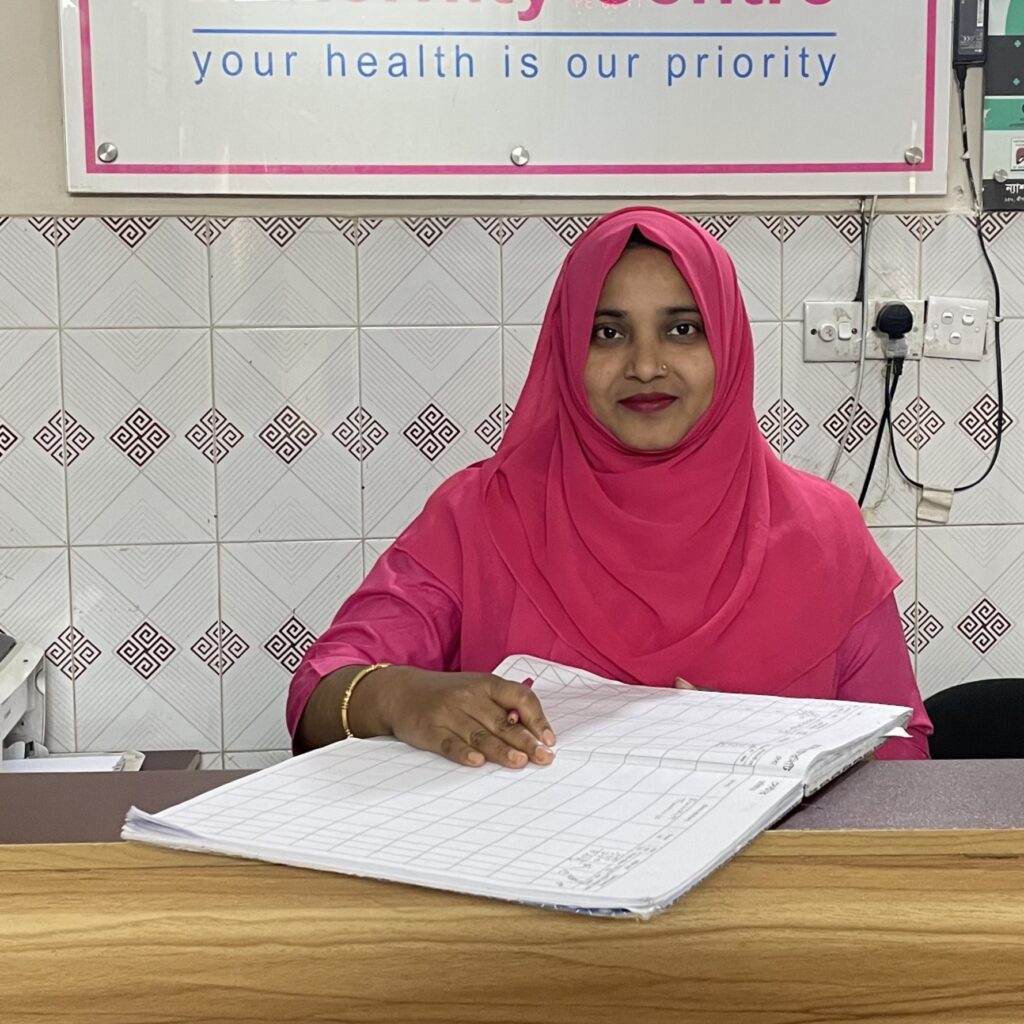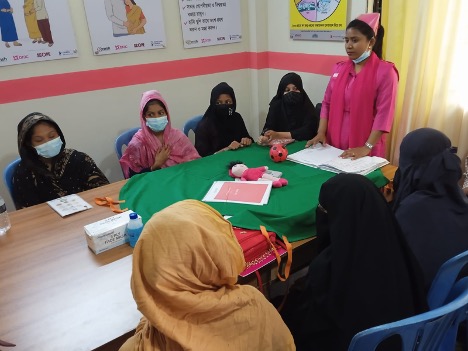Putting Women at the Center of the Health System in Bangladesh
Putting Women at the Center of the Health System in Bangladesh
By Jennifer Gardella

In Bangladesh, women confront many gender-related barriers—familial, financial, structural, and societal—to navigating the country’s health system and accessing maternal, newborn, and child health (MNCH) and family planning services when and where they need them. Only 21% of women receive standard quality antenatal care (ANC) services they need to keep themselves and their babies safe and healthy, according to the 2022 Bangladesh Demographic and Health Survey.
“Many challenges and barriers can impact a woman’s access to ANC and postnatal care (PNC) at both the community and the health facility levels. Financial issues are perhaps the main hindrance to accessing services,” says Rexona, a midwife at Tongi Maternity Center in Gazipur District, an urban, industrial township near the capital city of Dhaka. “In addition to financial constraints, another important barrier is a general lack of awareness about the importance of these health services, which contributes to a lack of support from their families,” adds Mukta, a midwife at Morkun Maternity Center, also in the Tongi area of Gazipur.
“I see many first-time mothers who are not empowered to make decisions, including around their own health care. Even when women may consider coming to a health facility, they can’t often get permission from their decision-maker—usually their husband or their mother-in-law.”
Mukta, midwife in Tongi, Gazipur District
To help address these challenges, Management Sciences for Health (MSH) is spearheading a culturally appropriate, group-based model of care developed through human-centered design that puts women and girls at the center of the health system. Through the Healthy Women, Healthy Families (HWHF) project (Shustha Ma, Shustha Poribar in Bangla), MSH is supporting the training and mentorship of midwives to deliver group sessions for first-time mothers and fathers at both the community level and maternity centers managed by local partner BRAC. This adaptive approach—co-designed with young women and health workers—complements the existing facility-based, individual care model within Bangladesh’s health system to increase access to and uptake of ANC and PNC services, optimize resources, engage families and communities, and promote women’s empowerment to advocate for their own health.
Both Rexona and Mukta have been part of the HWHF project since its inception, each participating in an initial four-day training on the group ANC (GANC) model. Under the model, midwives lead group sessions during which expectant mothers learn about how to take care of themselves and identify danger signs during their pregnancies; the women also receive individual check-ups, including an ultrasound, at no cost to ensure that they and their babies are healthy. Separate sessions are held for spouses to help them prepare to become fathers and learn how best to support and care for their wives during pregnancy, childbirth, and postpartum.
“As this was the first time the model was introduced in Bangladesh, I felt apprehensive at first about how to conduct the sessions,” recalls Mukta. “The roleplay activities we did [during the initial trainings] were especially helpful for understanding the new model. After that, I gained more confidence to deliver the sessions.”
Rexona remembers feeling similarly at the start. “[Before the training,] I felt nervous talking about these issues in front of groups, especially with men. However, after receiving the orientation, my fears vanished,” she recalls. “[The project’s ongoing support] gave me the confidence to communicate not only with mothers, but also their spouses and families.” This has been helpful, she asserts, in navigating challenges presented by the lack of familial support that women in these areas face.
Rexona quickly observed the advantages that implementing the group-based model of care would offer her patients. “During the group sessions, mothers learn from each other. The sessions are a space where mothers can exchange their views and thoughts, building relationships and learning along their pregnancy journeys.”

Mukta agrees with this assessment. “Although women hear this information from the service provider during their one-on-one checkups, it is all repeated and reinforced in the group sessions, which helps them remember it,” she says. “During the activities and story sharing time, I’ve also observed that mothers are interested in stories told by other mothers, since they are relatable. This model helps them learn more quickly and keeps them engaged.”
Beyond this support provided to first-time parents who have participated in the GANC sessions, both Rexona and Mukta have also observed the impact the model has had over time on health-seeking behavior in their communities. With the encouragement from their peers and without the burden of financial constraints, more and more women are seeking ANC and PNC services at their health facilities.
“Now, new mothers come to the sessions [at Tongi Maternity Center] very easily—some of them even take the initiative to call us to ask how to participate,” Rexona explains. “Additionally, the increased engagement from first-time fathers I’ve seen has been remarkable. I have noticed a shift in fathers becoming more responsible for taking care of their wives during pregnancy, delivery, and postpartum.”
“One first-time mother [who has participated in the group sessions] brings in another five mothers from the community, because they spread the message of good advice and cost-free checkups. This increases attendance at our maternity center.”
Rexona, a midwife in Tongi, Gazipur District
Mukta has observed a similar trend at Morkun Maternity Center. “The women are showing more interest in the group-based model of care. First-time mothers come to the center on their own and mention that they heard about the group session from other people through word of mouth, which makes me feel very happy.”
Since early 2022, the project has provided recurring training to midwives like Rexona and Mukta on the group-based model, allowing them to reach more than 4,400 first-time mothers through 815 ANC and PNC groups throughout the Tongi and Morkun areas. Additionally, nearly 2,400 first-time fathers have participated in group sessions. “As a service provider, I can say that this model brings about real change,” reflects Rexona. “I’ve seen how this approach addresses barriers to care and increases uptake of ANC and PNC services, which will decrease the risk of maternal and newborn morbidity and lead to healthier families in this community.”